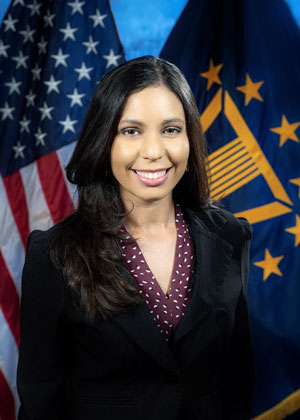VA Homeless Programs
Message from Monica Diaz, Executive Director, VHA Homeless Programs Office
September 2022

Before a recruit can become a United States Marine, they must overcome the Crucible: a 54-hour challenge featuring more than 45 miles of marching—all while managing food and sleep deprivation.
Our Navy’s sailors are trained to navigate 8,000-ton ships across some of the world’s most dangerous waters.
To graduate Ranger School, soldiers face 62 days—which often begin at 3:30 AM—of exercises to designed to push their mental and physical limits in all potential combat environments.
Veterans have been trained to do hard things.
But sometimes, the hardest thing to do is ask for help.
We see this every day in our work to combat Veteran homelessness. Stigma, pride, or feelings of shame can prevent Veterans from accessing the services they have earned and deserve—even when they are in urgent need. Other Veterans avoid seeking help based on their beliefs that “others have it worse,” or “need the help more.”
This Suicide Prevention Month, please join me in urging all Veterans: “Don’t Wait, Reach Out.”
The campaign’s website, VA.gov/REACH, allows Veterans to identify the specific life challenges they are struggling with (e.g., financial stress, employment, chronic pain), and provides tailored resources they can use to find customized support. I encourage everyone to explore this powerful tool and share it with all Veterans you work with and know.
Every time we share a resource with a Veteran, we let them know that no matter what they are going through, there are people and programs ready to help.
Every time we ask a Veteran how they are doing—and show them we are listening, really listening, to their answer—we prove to them that they are not alone.
And every time a Veteran receives a service from us—whether it's medical care, food, or keys to a new apartment—we let them know that they matter, they belong, and we need them here.
The work we do provides Veterans with a new type of training: training that equips them with beliefs, vocabulary, and desire to ask for our help.
For some Veterans, learning these skills is as arduous as a 45-mile march. However, when Veterans have capable and compassionate individuals like each of you to demonstrate these lessons, the mission ahead becomes manageable.
I believe that preventing homelessness is preventing suicide, and vice versa. We know that stressful events such as losing one’s job, going through a divorce, battling substance use disorder, or experiencing homelessness, are risk factors for suicide. Unfortunately, based on data from the recently released 2022 National Veteran Suicide Prevention Annual Report, we also know that the suicide rate among Veterans was 57.3% higher than that of non-Veteran adults in 2020.
Just as eliminating Veteran homelessness is a monumental task, so is eliminating Veteran suicide. Nonetheless, we know that both are possible, and both are essential. Every step we take towards ending homelessness leaves a dual footprint: it is also a step toward ending Veteran suicide. As we continue walking together, we will become a nation where “Veteran homelessness” and “Veteran suicide” are phrases only used in history books.
This month, and every month, I encourage you to remind our Veterans that asking for help is not a sign of weakness—it is a sign of strength. Whether asking for help securing permanent housing or with treatment for their physical or mental health, every time a Veteran has the courage to ask for help, they serve their country again by acting as a role model for their peers.
Likewise, we have the responsibility to practice what we preach—we can only take care of the Veterans we work with if we are taking care of ourselves and others. This month reminds us that It's Okay to Talk About Suicide, and all of us need help from time to time. We wouldn’t be human if we didn’t.
Ralph Waldo Emerson once said, “To know even one life has breathed easier because you have lived. This is to have succeeded.”
Please remember that every day you help a Veteran, a colleague, a neighbor, or yourself—you have succeeded.



















